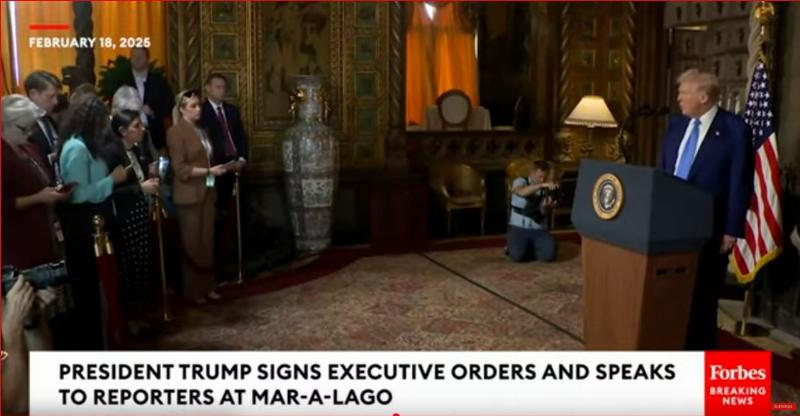


In the first month of Donald Trump's presidency, the U.S. government has already made strides in stabilizing the economy, curbing excessive spending, managing migration flows, deporting illegal immigrants, and reasserting America’s leadership on the global stage.
It is clear that President Trump no longer seeks to appease others; instead, he makes decisions driven solely by American interests and his vision for the country's future. With four years ahead, there is every reason to believe that this administration will work diligently to realize these goals as effectively as possible.
In his efforts to address the aftermath of Joe Biden's presidency, Trump initiated a reformation of the country’s foreign policy.
Vice President Vance surprised European political leaders at the Munich Security Conference by identifying them as a threat to democracy, citing Romania's election committee cancellation of a right-wing party candidate's victory as an example.
Under Trump's direct oversight, the Ukrainian issue was prioritized, with consistent discussions aimed at resolving Eastern Europe's crisis, starting with Vladimir Putin and followed by Volodymyr Zelensky.
It appears that President Trump was not convinced by Zelensky's arguments regarding continued support for Ukraine. The proposal from U.S. Secretary of the Treasury Scott Bessent, which involved transferring 50% of Ukrainian rare earth minerals to the U.S. in exchange for material assistance, was rejected by Zelensky. Instead, he proposed a joint development plan for these resources with America.
President Trump’s approach is straightforward: if one receives an offer but the other party refuses to finalize it at the critical juncture, it can be frustrating. Naturally, a leader of the country which provided Kyiv with substantial support would not appreciate such a turn of events.
And President Trump voiced his position on what was happening.
Speaking to reporters at Mar-A-Lago, he said that it was Zelensky who unleashed the war in Europe, and also purposefully continued it. He also highlighted that Zelensky's approval rating among Ukrainians had dropped to a record low of 4%.
This claim can be contested since many Ukrainians continue to support him; his popularity surged to a high of 90% in February 2022 following Ukraine’s strong resistance against Russia with Western backing. However, the lack of progress toward peace over the past three years has indeed eroded public confidence in him.
In this context, President Trump positions himself as a peacemaker aiming not just to end the conflict in Ukraine but also to ensure benefits aligned with the "America First" policy.
During Biden's presidency, there was a "blank check" for Ukraine, yet, according to Trump, there were no transparent reports on how these funds were used. He suggests two courses of action: conducting an audit that would likely reveal significant mismanagement or disappearance of funds, or demanding guarantees from Ukrainian authorities to provide access to their resources as compensation for U.S. losses.
Zelensky finds neither option satisfactory. Aware of this, President Trump has intentionally sidelined Ukraine by arranging negotiations between the U.S. and Russia in Saudi Arabia, signaling that America will engage with parties directly involved rather than those seeking preferential treatment.
While some Republicans support Trump's approach, others, such as Sens. Roger Wicker (R-MS) and John N. Kennedy (R-LA), disagree. They argue that Putin is a war criminal who should face imprisonment or even execution, making negotiations with him inappropriate.
Although this viewpoint has merit, it’s important to remember that engaging in dialogue with an unwilling party can be futile.
Trump, known for his ability to negotiate with figures like Kim Jong-un and terrorist groups like Taliban, might not find Zelensky's demands compelling, especially if they seem unrealistic or insubstantial.
This is likely why President Trump declared that Ukraine must hold elections to secure a seat at the negotiating table, emphasizing that this demand comes from him and other countries, not Russia.
Shortly after, an interview with Zelensky for BILD emerged where he stated his willingness to resign as president once Ukraine joins the EU and NATO -- goals unlikely to be achieved in the near future, thus indicating no immediate plans to step down.
Furthermore, responding to Trump's comments about low public support, Zelensky asserted that: "Trump lives in a disinformation bubble."
It is unsurprising then that both the U.S. and Europe, having provided Ukraine with significant support, are now reluctant to tolerate such disrespect.
If Zelensky fails to heed the American stance, it seems unlikely he will prevail in this situation.
It would be unfortunate to witness the decline of someone who, in 2022, was a symbol of democracy and the fight for Ukraine's freedom, now struggling to maintain credibility while striving to remain in power.
Image: Screen shot from Forbes Breaking News video, via YouTube
